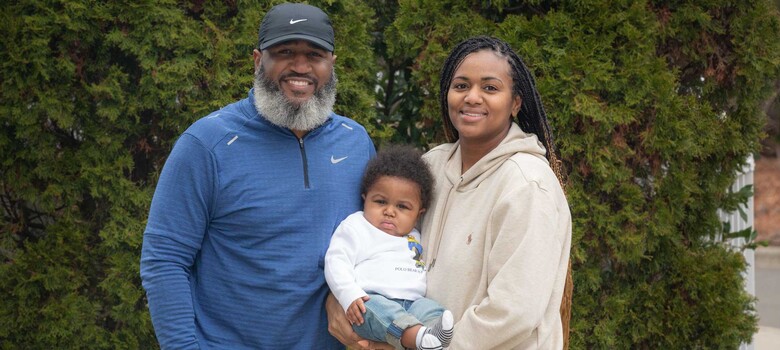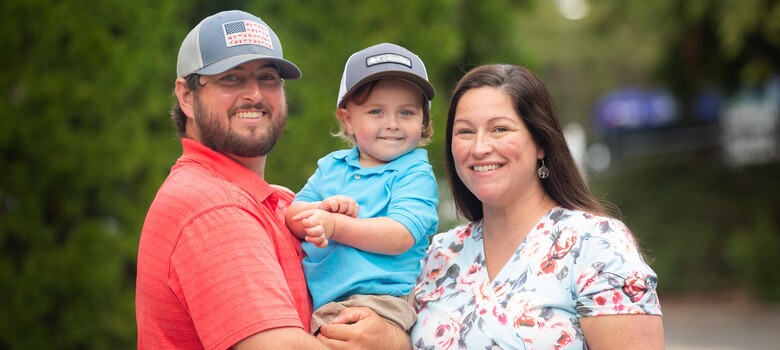Kidney Transplant Gives Child with Chronic Kidney Disease a Normal Childhood

Abrielle smiles outside of Duke Children's Health Center
Born with just one, poorly functioning kidney, Abrielle Barber faced significant challenges in her first five years of life, including getting nutrition from a feeding tube, daily injections of growth hormones, and nightly dialysis. Although she rarely complained, her parents wanted her to have a more normal childhood. A kidney transplant at Duke gave her just that.
Hoping for a Healthy Kidney
People can lead active, productive lives with a single kidney, so Abrielle’s parents, Gregory Barber and Ivora Preston of Raleigh, were hopeful that hers would function normally. However, within a few months of Abrielle’s birth, it was clear that her kidney could not keep up with the needs of her growing body. Doctors soon diagnosed her with chronic kidney disease.
Because Abrielle was significantly underweight, a feeding tube was surgically implanted to provide her with extra calories and nutrition, and her parents gave her daily shots of growth hormone. They also stayed alert for urinary tract infections (UTIs), which occurred frequently as part of her kidney disease.
A Diagnosis of End-Stage Renal Disease Leads to Dialysis
When an aggressive UTI turned into a month-long stay at Duke Children’s Hospital and Health Center, the family learned that the infection had damaged Abrielle’s kidney beyond repair. Although Barber and Preston had known she would eventually need dialysis, they hoped to put it off as long as possible. Now they had no choice; Abrielle had end-stage renal disease, meaning that her kidney was no longer functional. She had surgery to place a catheter that would allow dialysis to take place at home. “Dialysis was hard for her,” said Eileen Tsai Chambers, MD, a pediatric kidney transplant specialist and nephrologist at Duke Health. Abrielle had multiple infections and eventually switched to hemodialysis, which required visits to Duke three times a week and was harder on her body.
Preparing for a Kidney Transplant
Dialysis could take over the job of her failed kidney, but it was not a long-term solution. Only a kidney transplant would restore Abrielle’s quality of life. The first step was a comprehensive transplant evaluation. “We had to get her to a certain point in her growth, and they had to make sure we were on track as caregivers,” said her mother. At age four, Abrielle was approved for transplant, and her name was placed on the national waitlist for a donor organ.
Throughout it all, Abrielle was rarely distressed. “We were amazed by her demeanor,” said Barber. One year later, when they got the call that a donor kidney was a match for Abrielle, she was excited. “She didn't seem worried. We were fine because she was fine.”
A Team Approach to Kidney Transplant Care
The transplant surgery went “surprisingly quickly,” according to Preston, and her daughter’s new kidney functioned well. But a respiratory issue complicated her recovery. Although her parents were worried, they felt confident in their daughter’s medical care. “Everyone on the team has a voice for your child -- they are in your corner. When you have a good medical team, they have a way of not making you panic,” said her father. Dr. Chambers agreed. “We all came together -- the PICU, the transplant team, the surgeons -- to get her through with flying colors.”
Enjoying an Active Childhood
Today seven-year-old Abrielle is back in school and enjoys “anything that keeps her active,” said her parents. Feeding tubes, dialysis, and growth hormones are no longer a part of her life. According to Dr. Chambers, her story is an example of what Duke Health can do for children like Abrielle. “We transplant children who need to be transplanted no matter what, and we're able to handle complex cases. Look at her now. She has great kidney function; she's going to school; she's thriving.”




